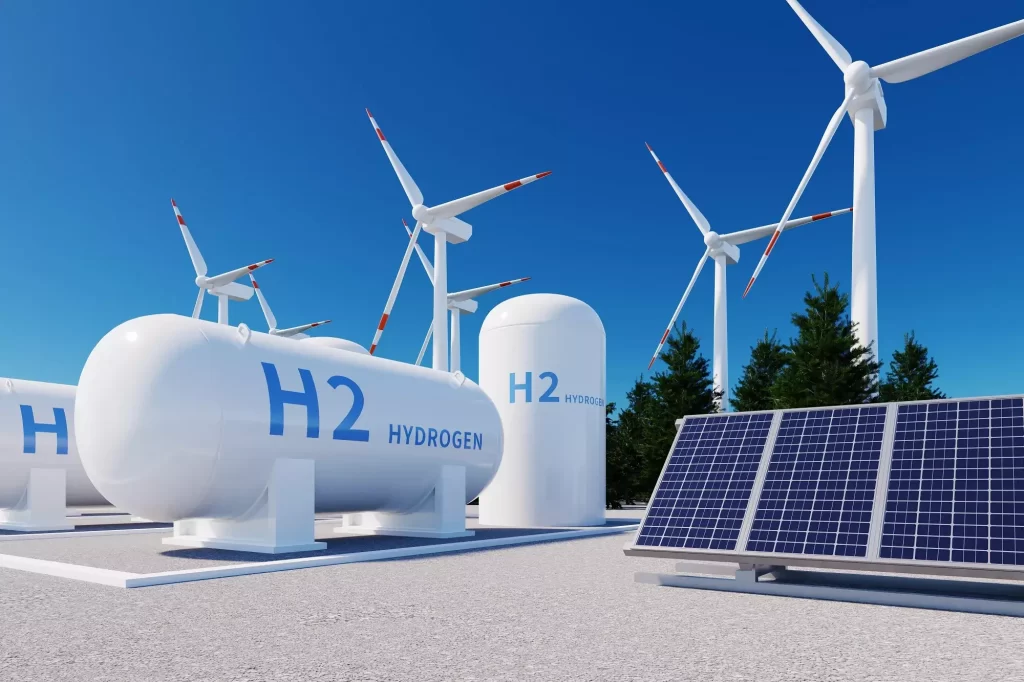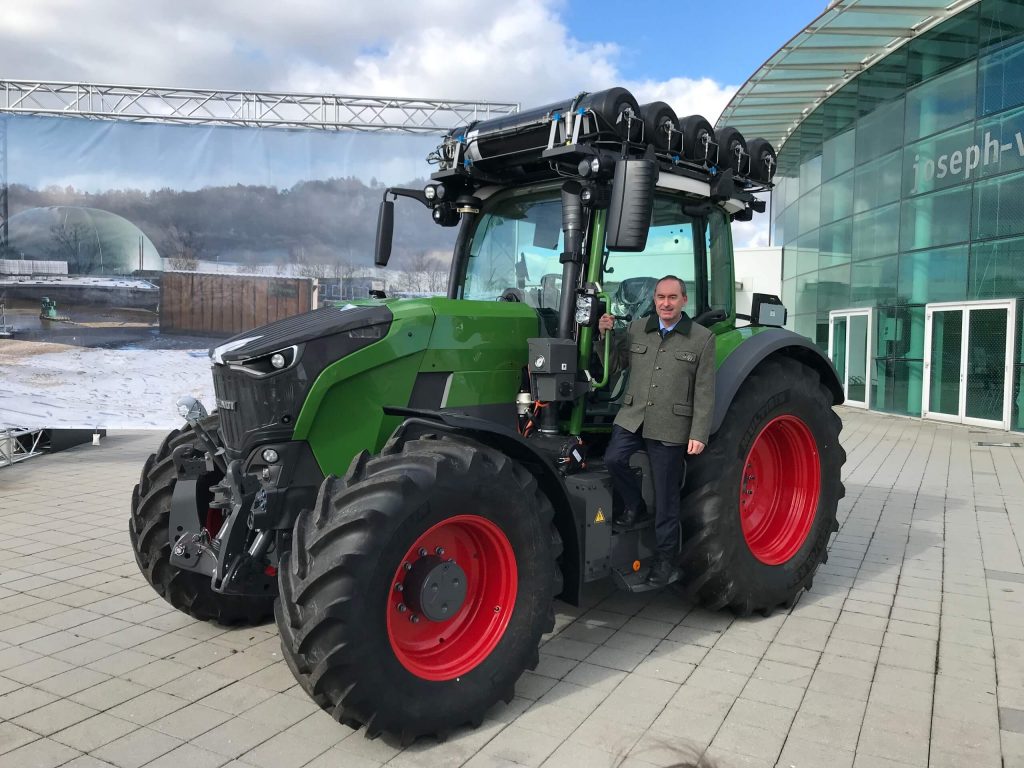The agricultural industry is at a pivotal moment, facing increased pressures to reduce its environmental impact while maintaining productivity. Traditional farming machinery, which is heavily reliant on fossil fuels, has long been a contributor to carbon emissions and environmental degradation. As the demand for cleaner energy solutions in agriculture grows, it becomes increasingly important to explore alternatives that offer sustainability while maintaining high performance. Hydrogen-powered tractors have emerged as a key innovation that could transform the agricultural sector by offering a more eco-friendly solution without compromising on the machinery’s capabilities.
In this article, we delve into the growing need for cleaner energy solutions in agriculture, particularly focusing on the potential of hydrogen-powered tractors. These machines promise to address not only the environmental concerns of farming but also the economic challenges by reducing fuel dependency and offering greater operational efficiency. Farmers are looking for ways to improve both their environmental footprint and their operational costs, making this shift towards hydrogen-powered machinery crucial for the future.
As we explore the various benefits and challenges of adopting hydrogen-powered tractors, we will also highlight the role that innovative brands like MINNUO are playing in making these advancements accessible to the farming community. The article will address the key aspects of hydrogen technology, from how these tractors work to their impact on the future of clean agriculture. This in-depth discussion will equip farmers with the insights needed to understand how transitioning to hydrogen-powered solutions can drive both ecological and economic gains in their operations.
Contents
- 1 I. Agriculture Requires Cleaner Alternative Solutions for Sustainable Development
- 2 II. Hydrogen-Powered Tractors: What Are They?
- 3 Ⅲ. Key Advantages of Hydrogen-Powered Tractors
- 4 Ⅳ. Challenges and Barriers to Adoption
- 5 Conclusion
I. Agriculture Requires Cleaner Alternative Solutions for Sustainable Development
Environmental Concerns:
Agricultural machinery traditionally runs on diesel or gasoline engines, both of which contribute significantly to greenhouse gas emissions and other pollutants. These emissions have an adverse effect on air quality, contribute to climate change, and can degrade soil health, leading to longer-term impacts on agricultural productivity and the environment. As a key sector for carbon emissions, agriculture plays a pivotal role in global climate change dynamics. Thus, transitioning towards cleaner, more sustainable fuel alternatives is crucial to mitigate environmental damage and ensure long-term agricultural health.
The challenge lies in the fact that traditional farming practices are ingrained in many agricultural systems. As a result, the machinery that powers agriculture—tractors, harvesters, and irrigation pumps—continues to rely on fossil fuels. This dependence is not only harmful to the environment but also increasingly expensive as fuel prices rise. Therefore, finding sustainable alternatives to fossil fuel-driven machinery is critical for the future of agriculture.
Growing Demand for Sustainable Solutions:
As agricultural systems expand, so too does the demand for sustainable farming practices. The pressure to reduce emissions from the agricultural sector has grown stronger, driven by government regulations, environmental organizations, and consumers who demand more eco-friendly food production. The global agriculture industry is also under increasing scrutiny from regulators and environmental bodies who are calling for more sustainable, clean, and renewable solutions in farming machinery.
Farmers need solutions that allow them to maintain production levels while reducing their carbon footprint and improving the overall sustainability of their operations. Additionally, clean technologies can improve energy efficiency, reducing operational costs and dependency on fluctuating fuel prices, which are a growing concern for agricultural businesses worldwide.
Limitations of Current Solutions:
Despite the efforts made with alternative solutions, current technological developments still face limitations, especially when it comes to large-scale, high-demand farming equipment. Solar-powered machinery, electric tractors, and biofuels are promising alternatives but remain underdeveloped for large-scale applications.
Solar-Powered Machinery: Solar power can provide energy for smaller machines or auxiliary tasks but does not yet offer the energy density necessary for high-load farming activities like plowing, planting, or large-scale harvesting.
Electric Tractors: While electric tractors are becoming more common, their limited range and long charging times are significant barriers to their widespread adoption, especially on farms that operate over vast areas.
Biofuels: While biofuels offer an environmentally friendlier alternative to traditional fossil fuels, their production and distribution infrastructure are still not on par with conventional fuels, which limits their scalability for large-scale agricultural operations.
Farmers need a robust, versatile solution that can meet the demands of high-output farming while minimizing environmental impact.
Current Clean Energy Solutions and Their Limitations:
Currently, hydrogen-powered machinery offers the most promising clean energy alternative for large-scale agricultural operations. Hydrogen fuel cells produce zero carbon emissions, have a longer operational range compared to electric machinery, and refuel much faster than recharging electric tractors. However, the widespread adoption of hydrogen-powered tractors faces significant challenges:
Hydrogen Production Infrastructure: The production and distribution network for hydrogen fuel is still in its infancy, particularly in rural and agricultural areas. Building out this infrastructure requires significant investment and time.
Initial Costs: Hydrogen-powered machinery is often more expensive upfront than conventional diesel or electric alternatives, making it an investment that may be difficult for smaller or medium-scale farms to afford initially.
Technological Maturity: While hydrogen technology has made significant strides, the efficiency of hydrogen storage, fuel cell longevity, and maintenance systems for agricultural machines still need further development before they can be implemented universally on farms.

II. Hydrogen-Powered Tractors: What Are They?
Working Principle of Hydrogen-Powered Tractors:
Hydrogen-powered tractors use hydrogen fuel cells to generate the energy needed for operation. These fuel cells work by converting chemical energy from hydrogen into electrical energy through an electrochemical reaction, which then powers the tractor’s electric motor.
In a hydrogen fuel cell, hydrogen gas is fed into the anode of the cell, while oxygen (from the air) is supplied to the cathode. This process produces electricity, water, and heat as byproducts. The electricity generated powers the tractor’s motor, while the only emission from the system is water vapor, making it an environmentally friendly alternative to traditional diesel-powered machinery.
The key components in hydrogen-powered tractors include:
Hydrogen Storage System: Specialized tanks that store compressed hydrogen gas at high pressure. These tanks must be strong and lightweight to withstand the pressure and ensure safe storage.
Fuel Cell System: This system converts hydrogen into electrical energy, and includes components such as the anode, cathode, and electrolyte membrane.
Electric Motor: The motor that powers the tractor using the electricity generated by the fuel cell system.
By harnessing hydrogen as a fuel source, these tractors offer a significant reduction in carbon emissions compared to conventional diesel or gasoline-powered tractors, contributing to cleaner and more sustainable agricultural practices.
Hydrogen-Powered Tractors vs. Traditional Diesel and Electric Tractors:
When comparing hydrogen-powered tractors with traditional diesel and electric models, several key advantages and disadvantages emerge.
Advantages of Hydrogen-Powered Tractors:
High Efficiency and Range: Hydrogen-powered tractors offer longer operational ranges compared to electric tractors, which rely on batteries that need to be recharged frequently. Hydrogen fuel cells can be refueled quickly, similar to conventional diesel-powered machines, and they provide consistent power without degrading over time as batteries do.
Cleaner Emissions: Unlike diesel engines, which emit carbon dioxide and other harmful pollutants, hydrogen-powered tractors produce only water vapor as a byproduct, drastically reducing environmental pollution and supporting sustainable farming practices.
Sustainability: Hydrogen is a renewable energy source, and when produced from water (via electrolysis), it provides a sustainable energy option for agriculture. Unlike fossil fuels, hydrogen can be sourced from various renewable resources, making it a long-term solution for reducing agriculture’s dependence on oil.
Disadvantages of Hydrogen-Powered Tractors:
Infrastructure Challenges: The production, storage, and refueling infrastructure for hydrogen fuel is still under development. Farmers in rural areas may face difficulties in accessing hydrogen refueling stations, which limits the practicality of hydrogen-powered tractors in certain locations.
High Initial Costs: Hydrogen-powered tractors are still in the early stages of development, and the technology required for their production and maintenance can be expensive. The upfront cost is higher than traditional diesel-powered tractors or electric models, making it a more challenging investment for farmers, particularly small-scale ones.
Technology Maturity: While hydrogen fuel cell technology has been tested in various industries, it is still relatively new to agriculture. The durability and longevity of the fuel cells, especially under the demanding conditions of agricultural work, remain to be fully proven.
Comparison to Electric Tractors:
Electric tractors are often seen as an immediate alternative to diesel-powered models due to their ability to run on renewable energy sources and lower operating costs. However, their limited range and long charging times make them less ideal for large-scale, high-demand agricultural operations.
Hydrogen tractors, by contrast, can operate continuously for longer periods without requiring lengthy recharges. The refueling time for hydrogen-powered tractors is much quicker than charging an electric tractor, making them more practical for continuous operations, such as those on larger farms.

Ⅲ. Key Advantages of Hydrogen-Powered Tractors
Environmental Benefits:
One of the most significant advantages of hydrogen-powered tractors is their positive environmental impact. These tractors operate using hydrogen fuel cells, which produce only water vapor as a byproduct, making them an environmentally friendly alternative to traditional diesel-powered tractors. Key environmental benefits include:
Zero Emissions: Hydrogen-powered tractors produce no carbon emissions, which directly helps in combating air pollution and reducing the agricultural sector’s carbon footprint. This is particularly important as agriculture contributes significantly to global greenhouse gas emissions, and moving towards cleaner energy sources is a key step in mitigating climate change.
Closed-Loop System: When the hydrogen is produced using renewable energy sources, such as solar or wind power, the fuel cycle becomes entirely sustainable. This system uses green energy for hydrogen production and helps to promote cleaner farming practices, contributing to the reduction of environmental pollution caused by traditional fuel sources.
Economic Benefits:
Hydrogen-powered tractors present long-term economic advantages that make them an attractive investment for farmers, despite their higher initial cost:
Reduction in Fuel Costs: While the upfront costs of hydrogen-powered tractors may be higher, the long-term savings in fuel expenses can make them a cost-effective option. Hydrogen is a renewable energy source, and with the right infrastructure, it can be produced at a lower cost than traditional fuels. Additionally, hydrogen fuel cells are more efficient than combustion engines, resulting in lower fuel consumption for the same work output.
Access to Government Incentives: Many governments are offering subsidies, tax incentives, or grants for adopting green technologies. Farmers can take advantage of these opportunities to reduce the initial investment burden. Moreover, as regulations around emissions become stricter, hydrogen-powered machinery may qualify for various environmental credits or financial incentives.
Long-Term Savings on Maintenance: Compared to diesel engines, hydrogen fuel cells have fewer moving parts, which generally means lower maintenance costs. These engines are less prone to wear and tear, reducing downtime and repair costs, thus offering a significant advantage for farmers looking to minimize operational disruptions.
Operational Benefits:
Hydrogen-powered tractors provide several operational advantages, making them ideal for both large-scale and high-intensity farming operations:
Faster Refueling: Unlike electric tractors that require long charging times, hydrogen-powered tractors can be refueled in just a few minutes, similar to the process of refueling a diesel vehicle. This quick refueling time allows for continuous operation, improving the efficiency and productivity of farming operations that require heavy machinery throughout the day.
Extended Operational Hours: Hydrogen-powered tractors are capable of running for longer periods without the need for long breaks, unlike their battery-powered counterparts, which need to be charged after several hours of use. This extended working time is especially beneficial for tasks such as plowing, planting, and harvesting, where long hours of operation are often required.
Higher Efficiency: Hydrogen fuel cells have a higher energy efficiency compared to internal combustion engines. This means that hydrogen-powered tractors can complete tasks more effectively, using less fuel and reducing operational costs over time.
Quiet Operation: Hydrogen-powered tractors operate more quietly than diesel-powered machines, reducing noise pollution on the farm. This can contribute to a more pleasant working environment, especially in areas where noise restrictions are in place, and is beneficial for both the workers and surrounding communities.
Ⅳ. Challenges and Barriers to Adoption
Infrastructure Limitations
The adoption of hydrogen-powered tractors in agriculture faces several challenges, primarily related to infrastructure limitations:
Hydrogen Refueling Stations: One of the most significant barriers to the widespread use of hydrogen-powered tractors is the lack of hydrogen refueling stations. Hydrogen infrastructure is not as developed as that for conventional fuels, making it difficult for farmers to refuel their equipment in rural areas or on large-scale farms. This limits the practical deployment of hydrogen tractors unless refueling stations are established, which requires substantial investment.
Electric Grid Integration: The development of the infrastructure for hydrogen production requires a well-connected power grid. In many rural areas, electricity networks are inadequate, which poses challenges for supporting hydrogen production via electrolysis. Without the necessary power supply and grid connections, hydrogen production becomes less viable and delays the widespread adoption of hydrogen-powered machinery.
Investment in Renewable Energy: The economic viability of hydrogen-powered tractors largely depends on the ability to produce green hydrogen, which requires renewable energy sources such as wind or solar. In many regions, especially those where renewable energy infrastructure is still underdeveloped, scaling up hydrogen production for agricultural use is difficult. This results in higher production costs and hinders the progress towards large-scale adoption.
Initial Costs and Investment
Hydrogen-powered tractors require significant upfront investments, which may deter some farmers from making the switch:
Higher Purchase Costs: Compared to traditional diesel-powered tractors, hydrogen-powered tractors are generally more expensive to purchase due to the advanced fuel cell technology involved. This price premium can be prohibitive for small to medium-sized farms, especially those with limited budgets. While the long-term savings in fuel and maintenance can offset these initial costs, the financial burden at the outset remains a challenge for many agricultural producers.
Funding and Financing Challenges: While some governments offer subsidies or incentives for adopting cleaner technologies, these financial aids are often not sufficient to cover the high initial costs of hydrogen-powered machinery. This creates a barrier for farmers who may not have access to additional financing options, making the transition to hydrogen power more difficult. For large-scale farms, securing adequate investment for such equipment might still be a challenge despite the potential for operational savings.
Technological Development and Reliability
Another barrier to the widespread adoption of hydrogen-powered tractors is the current limitations in technology:
Fuel Cell Efficiency and Durability: Hydrogen fuel cells, while efficient, still have some reliability issues in agricultural environments. These systems need to perform consistently under high stress and fluctuating temperatures, which are common on farms. The durability and longevity of fuel cells, especially in rugged farming conditions, are areas that still require significant improvement before they can match the reliability of traditional diesel engines.
Hydrogen Storage and Transportation: Storing and transporting hydrogen efficiently is another technical hurdle. Hydrogen must be stored under high pressure or at very low temperatures, which requires specialized storage tanks and equipment. This infrastructure is costly and adds to the complexity of implementing hydrogen solutions in agriculture. Moreover, the process of transporting hydrogen to rural and remote areas presents logistical challenges.
Hydrogen Production and Cost
The cost of hydrogen production remains a significant challenge in scaling up its use in agriculture:
Production Costs: Currently, hydrogen production, especially green hydrogen produced via electrolysis, remains costly compared to traditional fossil fuels. Although costs are expected to decrease with advances in technology, the reliance on renewable energy sources further elevates production expenses. These high production costs could undermine the economic viability of hydrogen-powered tractors in certain markets.
Dependence on Renewable Energy: As mentioned earlier, hydrogen production is closely tied to the availability of renewable energy. Regions without a strong renewable energy base must rely on less sustainable methods, such as natural gas reforming, which negates the environmental benefits of hydrogen tractors. This not only raises costs but also diminishes the clean agricultural promise that hydrogen technology aims to deliver.
Current Solutions and Their Limitations
While hydrogen technology in agriculture is still in its early stages, there are ongoing efforts to address these challenges:
Renewable Energy Integration: Many agricultural businesses are looking to integrate hydrogen production with local renewable energy sources, such as solar or wind farms, to reduce the cost of hydrogen and ensure a sustainable supply. However, scaling this process requires substantial investment in both renewable energy infrastructure and hydrogen production facilities.
Pilot Programs and Demonstration Projects: Several manufacturers and farming cooperatives are running pilot programs to showcase the potential of hydrogen-powered tractors. These programs are important for proving the technology’s feasibility and refining it for widespread use. However, these pilot programs are often limited in scope and do not address the full scale of agricultural operations.
Government Support: Governments are beginning to recognize the importance of clean agricultural solutions, and subsidies or tax incentives are being put in place to encourage the adoption of hydrogen technology. While these measures help alleviate some of the financial burdens, they are often not comprehensive enough to fully cover the high initial investment required for hydrogen-powered equipment.
Conclusion
Hydrogen-powered tractors represent a promising solution for sustainable agriculture, offering a cleaner and more eco-friendly alternative to traditional diesel-powered machinery. While challenges such as infrastructure development and high initial costs remain, the long-term environmental and economic benefits make hydrogen-powered tractors an appealing investment for the future of farming.
Farmers and agricultural stakeholders must consider the rapid advancements in hydrogen technology, which can contribute to a significant reduction in operational costs and environmental impact. By embracing hydrogen-powered equipment, such as those offered by MINNUO, farmers can play an essential role in shaping a more sustainable and efficient agricultural industry.
Encouraging collaboration between the agricultural industry, government entities, and private stakeholders is crucial to ensuring the widespread adoption of clean hydrogen technology. As more research and development efforts are focused on enhancing hydrogen infrastructure, farmers will increasingly see the benefits of this innovative solution. MINNUO remains committed to supporting these advancements, offering hydrogen-powered solutions that are designed to meet the evolving needs of modern agriculture, ensuring long-term productivity and sustainability.

